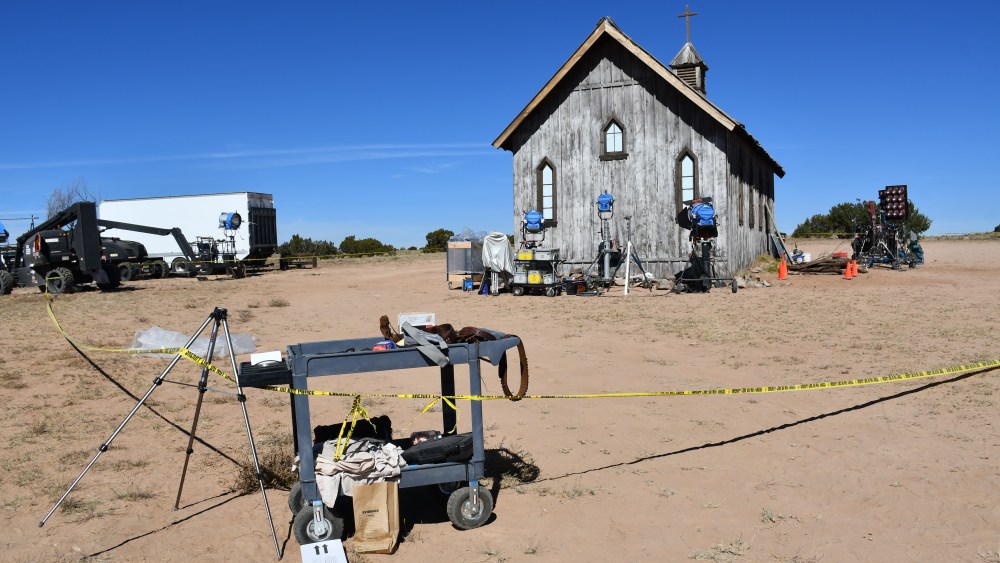‘Rust’ Armorer Was Offered Leniency If She Explained Source of Bullet
The prosecutor in the “Rust” case offered a “favorable” outcome last fall to armorer Hannah Gutierrez Reed if she would help explain how live rounds made it onto the film’s set.
But the offer came with a warning that if she refused, she would be hit with additional charges.
Gutierrez Reed is set to go on trial next month in Santa Fe, N.M., for the death of Halyna Hutchins, the “Rust” cinematographer. She faces up to three years in prison if convicted on charges of involuntary manslaughter and tampering with evidence.
Hutchins was killed in Oct. 2021 while preparing to film a scene with Alec Baldwin, who was holding a gun that fired a live bullet. Gutierrez Reed loaded the gun, which was supposed to contain only dummy rounds.
Several other live rounds were also recovered. During the investigation, a detective asked Gutierrez Reed why there would be live ammo on set.
“I have no idea,” she said at the time.
Investigators have still not determined where the live rounds came from.
The special prosecutor, Kari Morrissey, told Gutierrez Reed’s defense lawyer in an email last Sept. 28 that she believes Gutierrez Reed knows more about it than she has let on.
“I feel very strongly she has some notion of how the live rounds came on set,” Morrissey wrote. “I certainly respect her right not to come forward with that information and to stay silent, however if she were to come forward and answer some of these questions that plague the victims in this case that would go a long way toward getting her a favorable resolution.”
The prosecutor went on to say that there would be consequences if she refused.
“If she chooses not to,” Morrissey wrote, “while I respect her decision, I will proceed with the additional felony charges we spoke of.”
Gutierrez Reed’s lawyer, Jason Bowles, took that as a threat — either falsely confess to bringing the live rounds on set, or face additional charges.
Bowles responded by invoking his client’s right against self-incrimination.
A few weeks later, on Nov. 16, Gutierrez Reed was indicted on a charge of carrying a firearm in a liquor establishment, a fourth degree felony. According to the indictment, she brought a gun into the Matador, a Santa Fe dive bar, on Oct. 1, 2021, about 10 days after the shooting.
Bowles is now seeking to have that charge dismissed on several grounds. In a motion filed on Thursday, he argued that the charge was filed vindictively, in retaliation for exercising the right to remain silent.
“This is an extremely rare case in which we have a statement of the prosecutor’s motive behind charging,” Bowles wrote. “That charge was solely designed to pressure Ms. Gutierrez Reed into giving up her Fifth Amendment right to silence (to provide information she didn’t have) or face felony criminal prosecution on a totally unrelated charge.”
Bowles has also argued that the special prosecutor’s salary is paid by a specific appropriation by the New Mexico legislature, which limits her scope to the “Rust” case. Therefore, he argued that she has no authority to bring charges unrelated to the shooting.
He also argued that the evidence underlying the new charge came in part from an improper search of pictures and data on Gutierrez Reed’s phone. In the motion, Bowles said that the phone was turned over to investigators on condition that the search be limited to information relevant to the shooting.
Morrissey has yet to respond to the motion.
Morrissey and her co-counsel, Jason Lewis, are private attorneys who were appointed last March to take over the prosecution after the elected D.A. recused herself.
The D.A., Mary Carmack-Altwies, and another special prosecutor, Andrea Reeb, faced criticism over a series of missteps that plagued the initial handling of the case.
Baldwin was also initially charged with involuntary manslaughter, but that charge was dropped last April.
In October, Morrissey and Lewis said that “additional facts have come to light” that merited charges against Baldwin. They said they intended to bring the case to a grand jury within two months, though that time frame has passed without an indictment.

